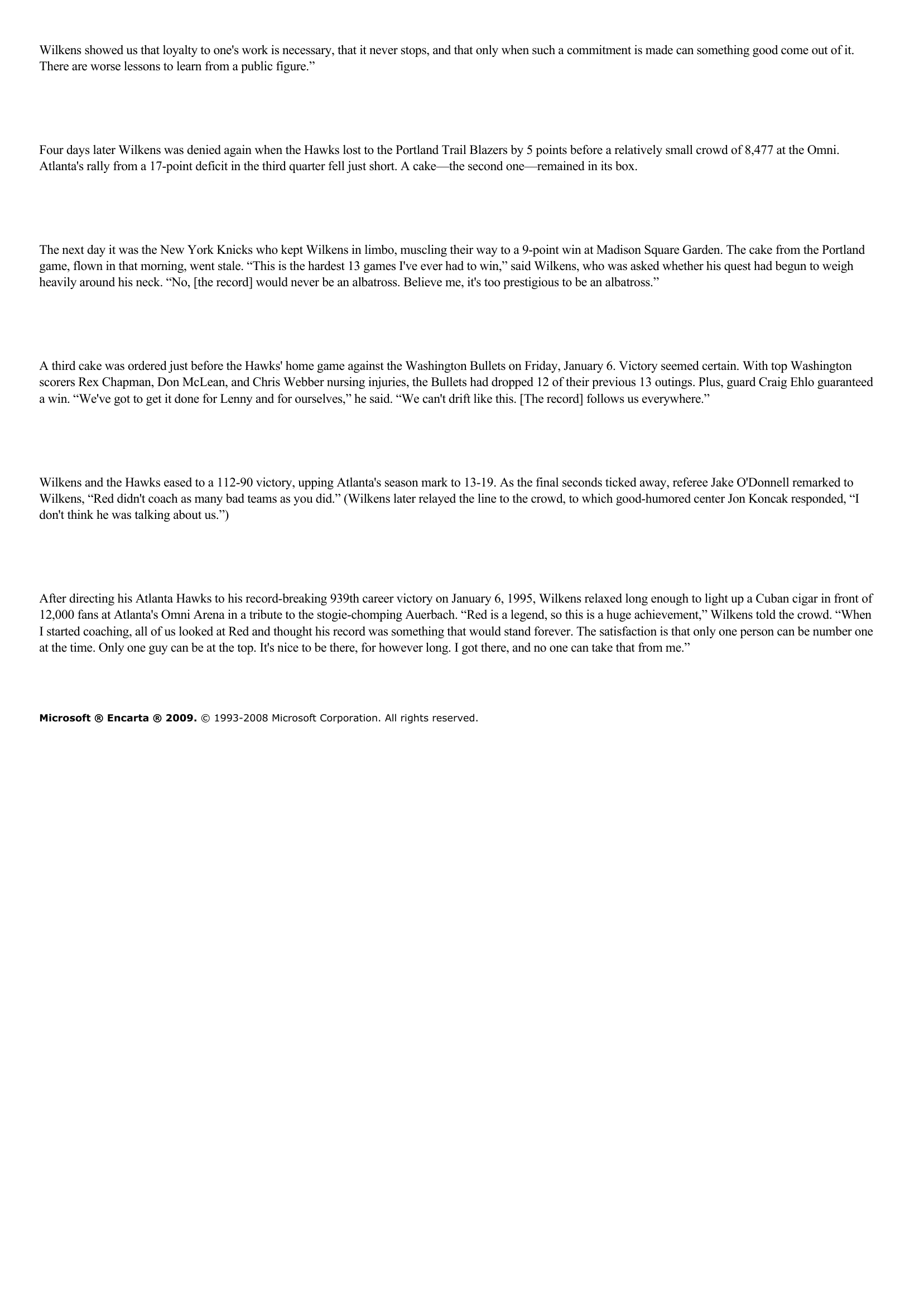Lenny Wilkens Takes All-Time Victory Record.
Publié le 14/05/2013

Extrait du document
«
Wilkens showed us that loyalty to one's work is necessary, that it never stops, and that only when such a commitment is made can something good come out of it.There are worse lessons to learn from a public figure.”
Four days later Wilkens was denied again when the Hawks lost to the Portland Trail Blazers by 5 points before a relatively small crowd of 8,477 at the Omni.Atlanta's rally from a 17-point deficit in the third quarter fell just short.
A cake—the second one—remained in its box.
The next day it was the New York Knicks who kept Wilkens in limbo, muscling their way to a 9-point win at Madison Square Garden.
The cake from the Portlandgame, flown in that morning, went stale.
“This is the hardest 13 games I've ever had to win,” said Wilkens, who was asked whether his quest had begun to weighheavily around his neck.
“No, [the record] would never be an albatross.
Believe me, it's too prestigious to be an albatross.”
A third cake was ordered just before the Hawks' home game against the Washington Bullets on Friday, January 6.
Victory seemed certain.
With top Washingtonscorers Rex Chapman, Don McLean, and Chris Webber nursing injuries, the Bullets had dropped 12 of their previous 13 outings.
Plus, guard Craig Ehlo guaranteeda win.
“We've got to get it done for Lenny and for ourselves,” he said.
“We can't drift like this.
[The record] follows us everywhere.”
Wilkens and the Hawks eased to a 112-90 victory, upping Atlanta's season mark to 13-19.
As the final seconds ticked away, referee Jake O'Donnell remarked toWilkens, “Red didn't coach as many bad teams as you did.” (Wilkens later relayed the line to the crowd, to which good-humored center Jon Koncak responded, “Idon't think he was talking about us.”)
After directing his Atlanta Hawks to his record-breaking 939th career victory on January 6, 1995, Wilkens relaxed long enough to light up a Cuban cigar in front of12,000 fans at Atlanta's Omni Arena in a tribute to the stogie-chomping Auerbach.
“Red is a legend, so this is a huge achievement,” Wilkens told the crowd.
“WhenI started coaching, all of us looked at Red and thought his record was something that would stand forever.
The satisfaction is that only one person can be number oneat the time.
Only one guy can be at the top.
It's nice to be there, for however long.
I got there, and no one can take that from me.”
Microsoft ® Encarta ® 2009. © 1993-2008 Microsoft Corporation.
All rights reserved..
»
↓↓↓ APERÇU DU DOCUMENT ↓↓↓
Liens utiles
- Hank Aaron Hank Aaron, born in 1934, American baseball player, nicknamed Hammerin' Hank, whose 755 home runs broke the all-time record previously held by Babe Ruth.
- Lance Armstrong Lance Armstrong, born in 1971, American cyclist, a record seven-time winner of the Tour de France, the most prestigious cycling race in the world and one of the most grueling contests in all of sports.
- Wolfgang Amadeus Mozart I INTRODUCTION Wolfgang Amadeus Mozart Wolfgang Amadeus Mozart, an 18th-century Austrian classical composer and one of the most famous musicians of all time, came from a family of musicians that included his father and sister.
- Ludwig van Beethoven I INTRODUCTION Ludwig van Beethoven Ludwig van Beethoven is considered possibly the greatest Western composer of all time.
- Billie Holiday Billie Holiday (1915-1959), one of the greatest jazz singers of all time.


